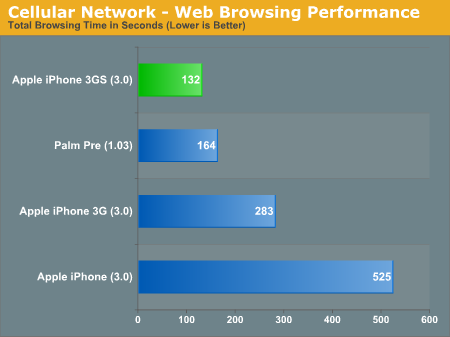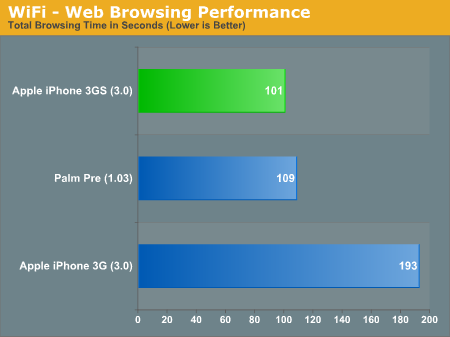Understanding the iPhone 3GS
by Anand Lal Shimpi on July 7, 2009 12:00 AM EST- Posted in
- Smartphones
- Mobile
The CPU and its Performance
I keep mentioning that the iPhone 3GS is faster than its predecessor, but these numbers speak louder than anything I can write:
| Application Launch Time | Apple iPhone 3G (3.0) | Apple iPhone 3GS (3.0) |
| Star Defense | 54.4 s | 22.9 s |
| Sims 3 | 28.0 s | 9.5 s |
| Resident Evil | 32.0 s | 22.5 s |
| Messaging App | 4.66 s | 1.97 s |
| Mail App | 2.31 s | 0.85 s |
| Search for "Man" | 4.0 s | 1.91 s |
| App Store | 7.2 s | 3.7 s |
| Power On Test | 39.7 s | 25.0 s |
| iPhone 3GS Advantage over iPhone 3G | 95% |
This is a generational improvement in performance folks. The new 3GS is, at worst, only 42% faster than the iPhone 3G. At best? Nearly 200% faster. Apple was right to abandon the aging ARM11 core used in the iPhone 3G in favor of the Cortex A8 in the 3GS. I also wonder if any of these performance gains are helped by using faster NAND flash in the 3GS. It wouldn't be enough to account for all of the performance boost, but perhaps 5 - 10%.
WiFi and 3G web page rendering speed is also a lot faster on the 3GS:
| 3G | Apple iPhone (3.0) | Apple iPhone 3G (3.0) | Apple iPhone 3GS (3.0) | Palm Pre (1.03) |
| anandtech.com | 41.0 s | 24.2 s | 14.0 s | 17.0 s |
| arstechnica.com | 34.4 s | 18.2 s | 9.6 s | 13.5 s |
| hothardware.com | 84.3 s | 58.3 s | 19.8 s | 23.0 s |
| pcper.com | 67.1 s | 35.1 s | 18.5 s | 22.1 s |
| digg.com | 75.2 s | 47.2 s | 19.9 s | 24.9 s |
| techreport.com | 44.5 s | 25.2 s | 13.6 s | 12.5 s |
| tomshardware.com | 75.7 s | 28.8 s | 22.2 s | 25.2 s |
| facebook.com | 103.4 s | 46.3 s | 15.4 s | 26.8 s |
I re-ran all of my web browsing performance tests on all of the phones to provide the most accurate comparison. I ran the Palm Pre data before the 1.04 OS release came out but apparently that update didn't improve browsing performance so I wouldn't expect much difference there.
The 3GS makes everything faster, including web browsing over the 3G network. Just to be clear, I used the full site versions of all of these web pages - I did not use any mobile or iPhone optimized sites in the timing. I tried to perform all of the tests at the same time to eliminate any network strangeness. Each test was performed three times and I reported the average.

The 3GS is nearly 300% faster than the original iPhone in browsing over the cellular network. Here the 3GS looks to be around 114% faster than the iPhone 3G - definitely worth the upgrade if you do a lot of browsing on your phone. The iPhone 3GS ended up 24% faster than the Palm Pre, but I suspect that most of that is due to performance differences between Sprint and AT&T at my house.
It is important to realize what we're talking about here. These phones, particularly ones that are using old ARM11 based SoCs, are CPU bound while loading web pages. Even while browsing over a relatively slow < 1Mbps cellular network, the CPU still ends up being a significant bottleneck to web page rendering performance. Compare that to how things work on the desktop - when was the last time you felt your PC was too slow to browse the web? The Cortex A8 is a huge step forward here, and once again, there's no excuse for putting any ARM11 in a high end smartphone today.
Let's remove more bottlenecks and see how big of a difference the CPU alone makes, the following tests were performed over WiFi:
| WiFi | Apple iPhone 3G (3.0) | Apple iPhone 3GS (3.0) | Palm Pre (1.03) |
| anandtech.com | 13.3 s | 8.8 s | 10.1 s |
| arstechnica.com | 12.8 s | 8.2 s | 8.2 s |
| hothardware.com | 35.8 s | 15.1 s | 11.6 s |
| pcper.com | 27.8 s | 17.3 s | 21.3 s |
| digg.com | 36.1 s | 17.5 s | 16.3 s |
| techreport.com | 17.1 s | 11.6 s | 7.8 s |
| tomshardware.com | 21.7 s | 12.2 s | 12.4 s |
| facebook.com | 29.3 s | 10.5 s | 22.1 s |
Remove the cellular bottleneck and things mostly stay the same between iPhones. The new 3GS is nearly 100% faster than the old 3G (and iPhone original). The major change comes from the comparison to the Palm Pre. The 3GS is now only 8% faster than the Pre, a significant improvement from the earlier releases of webOS. I do firmly believe that Palm has much room to improve performance on its device to bring it up to speed compared to the 3GS. It's running very similar hardware to the iPhone 3GS, there's no reason for it to feel so much slower.

Let me take this opportunity to also chastise HTC for using the Qualcomm MSM7200A in the new Hero smartphone. Here we have yet another Android OS phone using a horrendously old ARM11 based CPU, it’s just unacceptable. The table above shows you how much more performance is on the table if you move to Cortex A8. I’m still waiting for a handset maker to do Android justice and pair it with a truly robust hardware platform.










60 Comments
View All Comments
iwodo - Thursday, July 9, 2009 - link
Would really love Anand digg deeper and give us some more info. The info i could find for Atom, has 47 Million transistors. Ars report 40% of it is cache, while others report the core is 13.7 million. The previous iPhone article Jarred Walton commented that x86 decoder no longer matters because 1.5 - 2 million transistors inside a billions transistor CPU is negligible. However in Mobile space, 2M inside a 13.7M is nearly 15%. Not to mention other transistor used that is needed for this decoding.The space required for Atom is 25mm2 on a 45NM ( Including All Cache) . Cortex A8 require 9mm2 ( dont know how many cache ) on 65nm.
What is interesting is how Intel manage to squeeze the north bridge inside the Atom CPU ( more transistors ) while making the Die Smaller. ( i dont know if Intel slides were referring to the total package size or the die size itself ).
snookie - Thursday, July 9, 2009 - link
The Pre hardware, as in case, screen, keyboard is terrible. Cheap, plasticky and breaking left and right on people. If Palm survives long enough to get to Verizon etc Here's hoping they come out with better hardware soon. I've used Blackberries for year but I see no need for a physical keyboard. With the new iPhone widescreen keyboard I type with both thumbs very quickly and I have big hands.snookie - Thursday, July 9, 2009 - link
Jason, Apple has in fact agreed to using mini-usb as a standard. As if that is really a reason to buy a phone or not.To say Apple never changes shows no knowledge of the history of Apple, even their recent history.
Itaintrite - Wednesday, July 8, 2009 - link
Heh, it's funny how you say that you can't just look at clock speed, then followed with "the 528MHz processor in the iPod Touch is no where near as fast as the 600MHz processor in the iPhone 3GS." Heh.Anonymous Freak - Wednesday, July 8, 2009 - link
I want my punch and pie!Or a lollipop.
Good review, I could feel your hunger pangs toward both Palm and Apple toward the end...
monomer - Wednesday, July 8, 2009 - link
Regarding Anand's comments about Android phones needing an upgraded CPU, rumors are that the upcoming Sony Xperia Rachael will be sporting a 1GHz Qualcomm Snapdragon processor (ARM Cortex A8 derivative). Would love to find out the details of this phone when they become available.http://www.engadget.com/2009/07/04/sony-ericsson-r...">http://www.engadget.com/2009/07/04/sony...chael-an...
Affectionate-Bed-980 - Thursday, July 9, 2009 - link
Well I'd like to see Anand's experience with Android phones. What is it, just G1? Look at the new Hero or even G2. What about the Samsung i7500? Sorry I'm afraid that the limited nature of cell phone selection in the US makes it VERY HARD to review cell phones well here. I haven't seen a good cell phone site that's by people in the US and from the US only. Phone Arena, Mobile Burn, Phonescoop, GSM Arena, It seems the international guys get a LOT more exposure, and this is why I feel like Anand's comments about phones in general makes him sound inexperienced which I can certainly bet is the case.If you limit yourself to only carrier offered phones, then I don't think you can make accurate assessments about manufacturers like Nokia or certain OS phones like WinMo or Symbian or even Android unless the US starts offering more of what the world considers top notch popular phones.
Affectionate-Bed-980 - Wednesday, July 8, 2009 - link
N97 specs should be 434 MHz ARM11 not 424...Affectionate-Bed-980 - Wednesday, July 8, 2009 - link
BTW I don't believe you should be commenting about the N97. Gizmodo is heavily biased towards iPhones and unless you yourself Anand uses some Symbian S60 phones with detail, I don't really think you should join in the S60 bashing. I think a lot of us Symbian users AGREE that the platform needs to improve, but considering we were like ZOMG434MHZFAIL, the N97 is not bad in response time if you look at a few videos. The UI exceeded a lot of expectations amongst the Symbian crowd. If anything why don't you throw the Samsung i8910 Omnia HD in there instead? That has a Cortex A8 and uses Symbian S60v5 (not to mention has been out longer than the N97). The other S60v5 phone to come out is the Sony Satio which also uses a Cortex A8.You might as well comment on why Cortex A8 isn't being implemented in all new phones. WinMo phones are still on ARM11, and even HTC's newest announcements are ARMv7 chips. The iPhone doesn't define what high end is. Because if you want to point out that its unacceptable to have a ARMv7 chip in an N97, then it's just as unacceptable for the iPhone not to have a 5MP camera and multitasking.
straubs - Wednesday, July 8, 2009 - link
1. It IS unacceptable for any flagship phone to use ARM11. The iPhone, Pre, and Omnia HD (as you pointed out) all use it, so why wouldn't Nokia put it in it's $700 N-series flagship? It doesn't make sense. I'm surprised he didn't mention the crappy screen on the N97.2. He did comment on how the iPhone needs multi-tasking and how much he missed the Pre's implementation of it.
3. Doesn't everyone at this point agree that the number of megapixels in a phone camera is not a huge deal, considering the size of the sensor and optics? I would guess the N97 pictures are better than those from the the 3GS, but nothing like the jump from an ARM11 or A8.